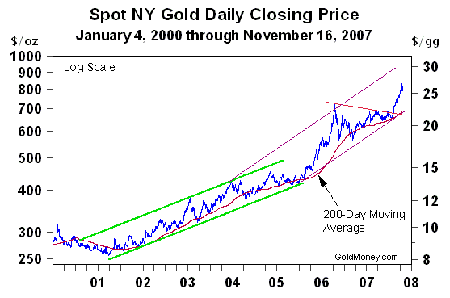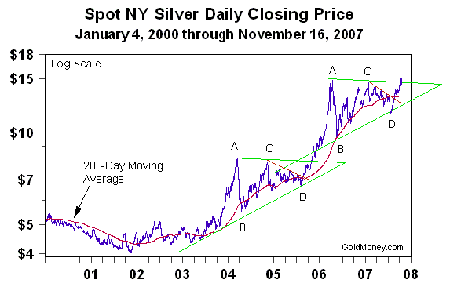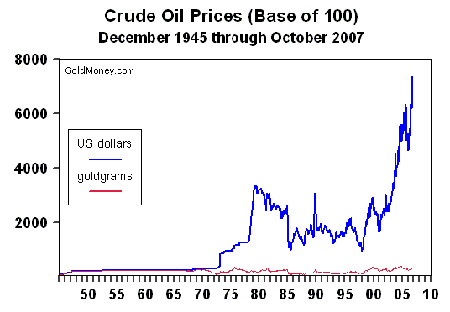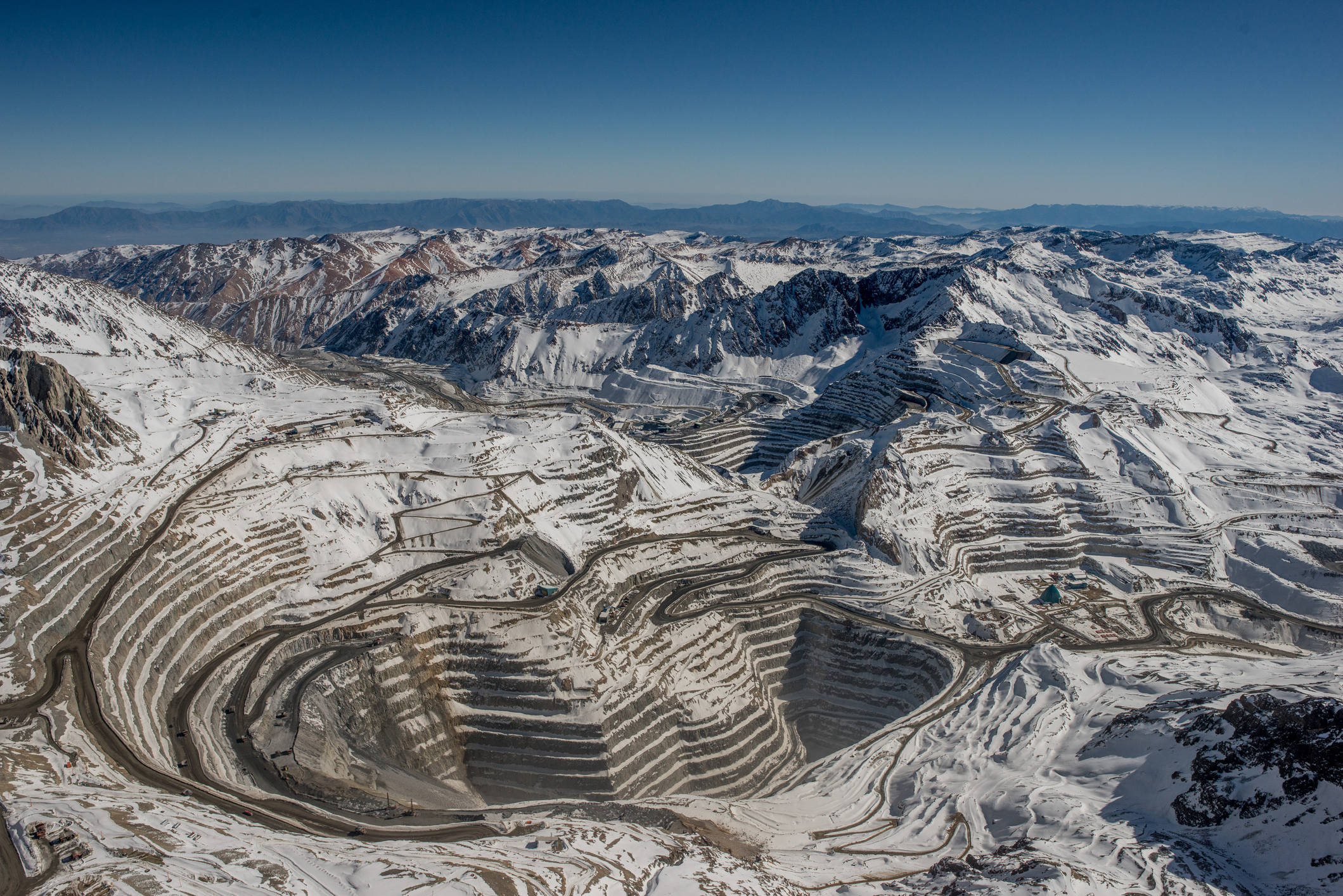Get the latest financial news, insights and expert analysis from our award-winning MoneyWeek team, to help you understand what really matters when it comes to your finances.
You are now subscribed
Your newsletter sign-up was successful
Want to add more newsletters?

Twice daily
MoneyWeek
Get the latest financial news, insights and expert analysis from our award-winning MoneyWeek team, to help you understand what really matters when it comes to your finances.

Four times a week
Look After My Bills
Sign up to our free money-saving newsletter, filled with the latest news and expert advice to help you find the best tips and deals for managing your bills. Start saving today!
Last week gold dropped $46.80, which is a decline of -5.6%. That drop seems fairly large, but let's step back to get some perspective.
It is interesting to note that in the 79 weeks since reaching its high in May 2006, there have now been five weeks in which gold has lost 5% or more, which is 6.3% of the time. So a 5% decline in one week is not new.
More importantly, it is reassuring to note that gold eventually overcame the four previous declines of 5% or more. In other words, last week's decline came after gold had already made a new 27-year high. Recovering from sharp short-term corrections is a clear sign that gold is still in a bull market.
MoneyWeek
Subscribe to MoneyWeek today and get your first six magazine issues absolutely FREE

Sign up to Money Morning
Don't miss the latest investment and personal finances news, market analysis, plus money-saving tips with our free twice-daily newsletter
Don't miss the latest investment and personal finances news, market analysis, plus money-saving tips with our free twice-daily newsletter
The following chart remains bullish. Consequently, once this current correction ends, I expect gold will climb higher.

Gold is in a clear uptrend, so stay with this major trend.
Last week silver retraced the previous week's break-out from the pennant consolidation pattern it had been forming since last year. Despite this setback, the silver chart remains bullish too.

When a correction occurs, it is always prudent to see if anything meaningful has changed. Did any of the factors driving the precious metals higher for the past several years suddenly disappear in the past week? No, nothing has changed. If anything, there is now another reason to own gold. OPEC has inadvertently made clear their internal disagreement about continuing to accept dollars in payment for their oil exports.
Late Friday afternoon - after the gold market had already closed - Bloomberg and other news services reported the discussions of a meeting of OPEC ministers intended to be held behind closed doors but accidentally broadcast on closed-circuit television to reporters in the media room.
According to Bloomberg: 'Saudi Arabia, the world's largest crude oil exporter, rejected a proposal by Iran and Venezuela to discuss the weak dollar at this weekend's OPEC summit in Riyadh, saying it didn't want the U.S. currency to 'collapse.''
A Reuters article published by the Guardian in the UK quotes Price Saud al-Faisal Saudi Arabia's foreign minister as follows: 'My fear is that any mention that OPEC makes of studying the issue of the dollar, will in itself have an impact...Just indicating that we have charged finance ministers with studying this issue...would mean a decision taken by OPEC would have the opposite effect and the media would pick up on this point...And then perhaps we would find that the dollar had collapsed, instead of us having done something in the interest of our countries.'
Yahoo reproduced an AFP news report saying: 'Iran's Foreign Minister Manouchehr Mottaki said in a written proposal that a final declaration by OPEC leaders, who arrive here Saturday for a two-day summit, should express concern by member states over the fall of the US dollar. Reacting to the request...Prince Saud...warned that mentioning the falling dollar could lead to the 'collapse' of the US currency...Member states should express concern over 'the continued depreciation of the US dollar' in the final declaration, Mottaki said.'
The report on Yahoo went on to quote Prince Saud as saying: 'This is a sensitive issue. It will cause the dollar to drop further, thus complicating the problems we are facing from the dollar's fall.' After 30 minutes, someone became aware of the gaffe, and an OPEC official turned off the closed-circuit TV. Nevertheless we learned enough. We already know about central banks and savvy investors diversifying out of dollars, and we now know that OPEC is talking about it too.
If it wants a stable oil price, which is its stated aim, then OPEC should be pricing oil in terms of gold. This point is made clear in the following chart. When viewed in terms of gold, the price of oil has barely changed over the 62-years in this chart.

Here is how I explain the message of this chart in a recent interview with the Gulf Research Center, a privately-funded, non-partisan think tank in the Gulf region.
'With other [Gulf Cooperation Council] countries now reviewing their currency pegs to the dollar as Kuwait has done, they should be thinking about defining their currencies as a weight of gold rather than some basket of constantly inflating fiat national currencies. Linking to gold would bring a level of price stability to the region not available from linking to any basket of currencies.'
Oil was effectively priced in terms of gold until 1971 when the dollar was still on the gold standard, which explains the consistency in the red and blue lines on the above chart up to that date.
Will OPEC abandon the dollar and once again price its crude oil in terms of gold? There are clear reasons for doing so, which is another good reason why we should own gold.
James Turk is the Founder & Chairman of GoldMoney. He is the co-author of The Coming Collapse of the Dollar.
Get the latest financial news, insights and expert analysis from our award-winning MoneyWeek team, to help you understand what really matters when it comes to your finances.
MoneyWeek is written by a team of experienced and award-winning journalists, plus expert columnists. As well as daily digital news and features, MoneyWeek also publishes a weekly magazine, covering investing and personal finance. From share tips, pensions, gold to practical investment tips - we provide a round-up to help you make money and keep it.
-
 Should you buy an active ETF?
Should you buy an active ETF?ETFs are often mischaracterised as passive products, but they can be a convenient way to add active management to your portfolio
-
 Power up your pension before 5 April – easy ways to save before the tax year end
Power up your pension before 5 April – easy ways to save before the tax year endWith the end of the tax year looming, pension savers currently have a window to review and maximise what’s going into their retirement funds – we look at how
-
 Is the market missing the opportunity in energy?
Is the market missing the opportunity in energy? -
 6 stocks to buy to invest in Latin America
6 stocks to buy to invest in Latin AmericaThe region is the world’s one-stop shop, boasting the raw materials required for the energy transition and key foodstuffs to cater for growing populations, says James McKeigue. Here’s how to profit.
-
 The demand for oil is slowing and green energy is taking over
The demand for oil is slowing and green energy is taking overThe IEA forecasts oil demand growth to slow sharply in the next few years. The end of the era may be underway.
-
 Is now the time to invest in oil as oil stocks top the S&P 500?
Is now the time to invest in oil as oil stocks top the S&P 500?Tips Oil stocks have enjoyed massive gains in the S&P 500. We take a look at the index’s best and worst performers and if now is a good time to invest in crude oil.
-
 Fuel prices could rise again as Opec cuts production
Fuel prices could rise again as Opec cuts productionNews Major oil-producing countries have decided to cut oil production by two million barrels per day – could this mean higher fuel prices?
-
 Why is the petrol price rising again?
Why is the petrol price rising again?Brits are being hit by a triple-whammy of increasing oil prices, a falling pound, and new fuel mix standards that are pushing up petrol prices
-
 John Wood Group: needs polish, but has plenty of potential
John Wood Group: needs polish, but has plenty of potentialTips Oilfield engineer John Wood’s share price has underperformed, its prospects are solid and it looks too cheap
-
 Five London-listed stocks to play the coming oil shortage
Five London-listed stocks to play the coming oil shortageTips After peaking in June, the oil price has fallen back and oil companies have fallen out of favour with investors. But with supply predicted to outstrip demand, there are plenty of opportunities to profit. Here, Rupert Hargreaves picks five of the best London-listed oil stocks to buy now.

